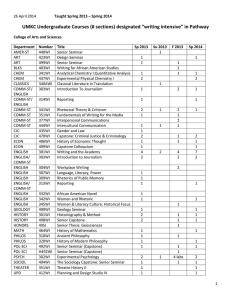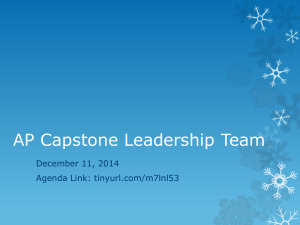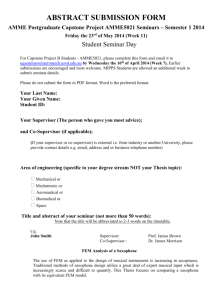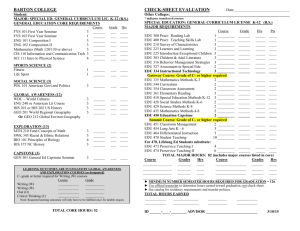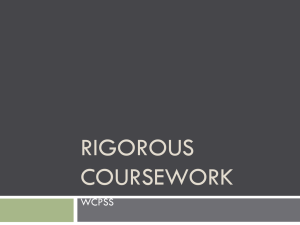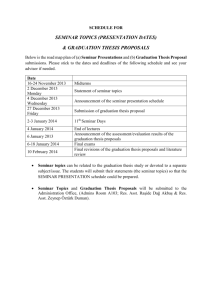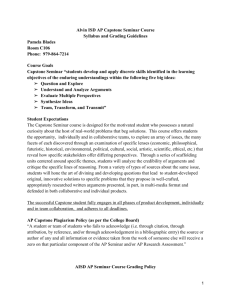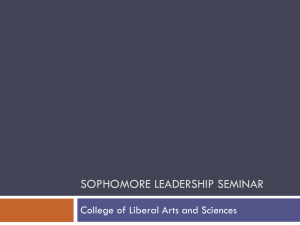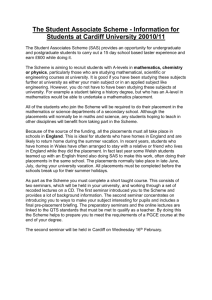AP Capstone - Pinellas County Schools
advertisement
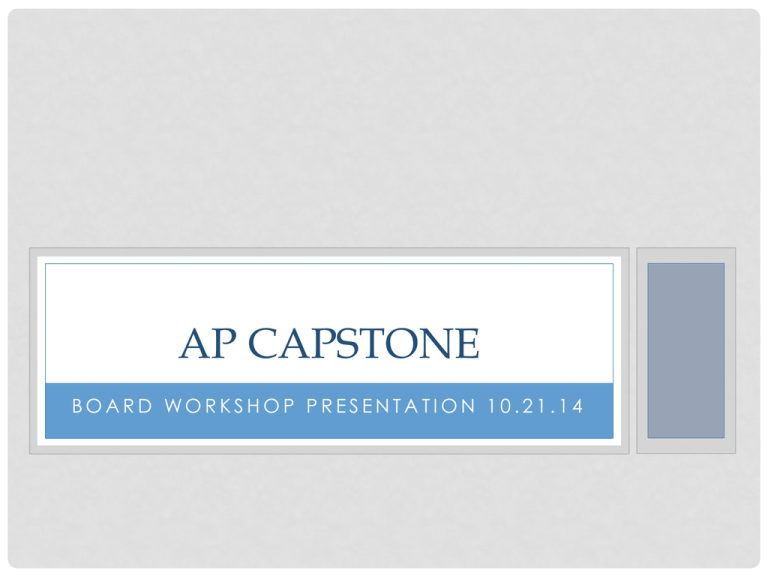
AP CAPSTONE BOARD WORKSHOP PRESENTATION 10.21.14 Why/how was the program developed? • Response to feedback from higher education faculty & at the request of the College Board higher education membership institutions • Partners in curriculum development and/or approval • • • • • • • • • • • • • Smith College Stanford University University of Illinois, Chicago University of Kentucky Columbia University University of California, Berkeley Duke University University of Tulsa Stanford University Brown University Harvard Graduate School of Education Brigham Young University UCLA • Institutions awarding credit for completion of Capstone courses Framework of the AP Capstone Program • QUEST • • • • • Question & explore Understand & analyze arguments Evaluate multiple perspectives Synthesize ideas Team, Transform & Transmit • Quest is a recursive process where students go back and forth between the stages of the process as new information becomes available Coursework and Assessments – Grade 11 • AP Seminar • Develop and strengthen analytic and inquiry skills through exploration of 2 to 4 relevant issues chosen by the student and/or teacher (possible topics – whether national security is more important than a citizen’s right to privacy, whether genetic engineering is a benefit to society) • Consider multiple perspectives • Evaluate the strength of an argument • Make logical, fact-based decisions • Students will question, research, explore, pose solutions, develop arguments, collaborate and communicate using a variety of media • Assessment - exam score is based on all 3 components and is reported on the standard 1-5 AP exam scoring scale • Team project • Individual paper & presentation • Written exam Coursework and Assessments – Grade 12 • AP Research • Cultivate the skills and discipline necessary to conduct independent research in order to produce and defend a scholarly academic thesis • Design, plan, and conduct a year-long evidence-based investigation on a topic of individual interest • Students will demonstrate an understanding of research methodology; employing ethics in research practices, accessing, analyzing and synthesizing information to build, present and defend their argument • Assessment - exam score is based on all 3 components and is reported on the standard 1-5 AP exam scoring scale • Academic paper (approx. 5000 words) • Presentation of thesis • Oral defense of the thesis Recognition • AP Capstone Diploma • 3 or higher in AP Seminar • 3 or higher in AP Research • 3 or higher for at least 4 additional AP exams • AP Seminar & Research Certificate • 3 or higher in AP Seminar • 3 or higher in AP Research PCS High Schools Participating • 2014-15 • Boca Ciega, Countryside & Northeast begin to mplement AP Seminar • 2015-16 • Boca Ciega, Countryside & Northeast begin to implement AP Research • Dunedin, East Lake, Gibbs, Lakewood, Osceola, Pinellas Park and Seminole begin to implement AP Seminar • 2016-17 • Dunedin, East Lake, Gibbs, Lakewood, Osceola, Pinellas Park and Seminole begin to implement AP Research • Awaiting College Board approval to begin AP Seminar in additional schools in th3 2016-17 academic year Resources • For additional information: • https://lp.collegeboard.org/ap-capstone • Teacher Training • AP Summer Institute • 2014 Miami – 3 AP Seminar teachers • 2015 Tampa Bay area – 7 AP Seminar teachers & 3 AP Research teachers • Instructional Materials • Very little required due to the course content being determined based on teacher and student interests • Instructional resources needed – computer lab for research purposes • Support for teachers of AP Seminar & AP Research • Bard Keeler, College Board Director of AP Capstone • Lives locally, provides support as needed in addition to being the lead coordinator of teacher training
